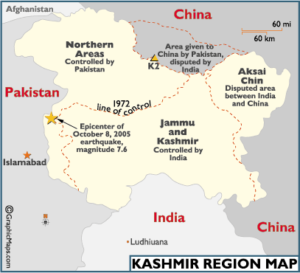By Sher bano 27 January 2023
The Indian government has dramatically intensified its suppression of rights in Jammu and Kashmir in the past three years since the abrogation of Article 370. Since then, Pakistan has made various efforts to peacefully resolve the longstanding Kashmir issue. Pakistani leaders have reiterated Pakistan’s firm determination to continue supporting the Kashmiri people until the realization of their inalienable right to self-determination. Pakistan’s diplomatic response has been prodigious in raising global awareness of the Indian atrocities at IIOJK and in reaffirming solidarity with the Kashmiri people. To perpetuate its illegal occupation, India is instituting demographic change in IIOJK in contravention of international law, including the UN Charter, UN Security Council resolutions, and the 4th Geneva Convention. In order to crush Kashmiri’s legitimate struggle for self-determination, India has unleashed the worst form of state terrorism and widespread systematic human rights violations against the IIOJK people without regard to international human rights and humanitarian law.
The situation in occupied Jammu and Kashmir has become more dreadful since August 5, 2019, when the Modi regime revoked the territory’s special status and stripped away all basic rights and freedom of the Kashmiri people. The BJP government has executed various policies and strategies aimed at altering the demographics of the disputed valley. These include changes in laws regarding residency status and land ownership to encourage Hindus to settle in Illegally Indian Occupied Jammu and Kashmir. The Indian government also made changes to the domicile law to facilitate new settlements in the occupied territory. Kashmiris fear that India is following the model of the Israeli occupation of Palestine. Under this model, the Modi regime seeks to establish settler colonies to help it control the territory.
Ladakh was part of Jammu and Kashmir before the Union government read Article 370 and divided the former state into two union territories: J&K with a legislature and Ladakh without a legislature. On January 7, 2023, the Leh Apex Body (LAB) and Kargil Democratic Alliance (KDA) grouping decided to boycott the high-level committee formed by the Union Home Ministry to discuss measures to protect culture and language unique to the region. The grouping said it was unanimously decided to intensify agitation in the coming days against the refusal of the BJP-led Union government to accept its road map to resolve the issues in Ladakh. One of the group’s four key demands was statehood for Ladakh, which was separated from J&K and downgraded to a hollow Union Territory without a legislature. Other demands include constitutional guarantees under the Sixth Schedule, the formation of the Public Service Commission and the reservation of jobs for local youth, and the creation of two separate parliamentary constituencies for Leh and Kargil.
The revocation of article 35-A in particular paved the way for the BJP to implement its agenda in Kashmir, as the annulment of the article practically opened the floodgates for non-Kashmiris to settle in the region. The abolishment of Articles 370 and 35-A had been the dream project of right-wing Hindu supremacists, which was finally executed and implemented by Modi, the RSS leader. The establishment of separate housing colonies of Pandits and Sanik in the Kashmir Valley was part of the BJP’s policy of settler colonialism. These policies not only go against international law and other human rights treaties, but these actions also violate United Nations Security Council resolutions that emphatically prohibit an occupying state from making any unilateral decision that could undermine the status of a disputed territory. Furthermore, changing the electoral map of the state and now granting voting rights to outsiders speaks volumes about the malicious intentions of the Indian government to undermine the role of the indigenous population in the political decision-making process.
Kashmiris are facing a serious existential threat and there is a dire need for the world to come to the rescue of the Kashmiri people and play its part in helping Kashmiris achieve their cherished goal of freedom by allowing them to exercise their right to self-determination guaranteed to them to them by the international community. Lasting peace and security in South Asia depends on the peaceful resolution of the protracted Jammu and Kashmir dispute in accordance with relevant UN Security Council resolutions and the wishes of the Kashmiri people. Pakistan calls on the international community to instill in India the imperative to reverse its unilateral and illegal measures instituted in IIOJK since 5 August 2019, stop all human rights violations, revoke demographic changes in IIOJK and peacefully resolve the Jammu and Kashmir dispute in accordance with international legitimacy. Pakistan will continue to provide all possible support to the people of Kashmir for the realization of their inalienable right to self-determination, as enshrined in the relevant UN Security Council Resolutions.
The writer is working as a Research Officer at the Strategic Vision Institute (SVI), a non-partisan think-tank based out of Islamabad, Pakistan.

